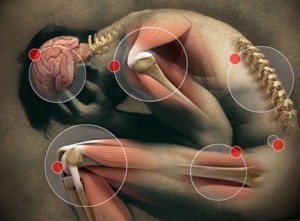 Chronic pain is a serious health problem in Canada. Overall, between 10 and 12 per cent of Canadians live with chronic pain (from CIRPD). And the numbers increase with age. In a 2005 survey, close to one third of Canadian seniors reported living with chronic pain.
Chronic pain is a serious health problem in Canada. Overall, between 10 and 12 per cent of Canadians live with chronic pain (from CIRPD). And the numbers increase with age. In a 2005 survey, close to one third of Canadian seniors reported living with chronic pain.
Chronic pain can impact life in many ways. It can limit full participation in work life, leisure activities and hobbies. It can have a psychological effect on their self-image, self-worth, relationships and overall quality of life. For about half of chronic pain suffers, it worsens their financial situation (from the limits of employment, costs of treatment, etc.).
Chronic pain often originates with a traumatic injury or infection. However, for some, there is no past injury or evidence of bodily trauma. With chronic pain, signals of pain which are normal and adaptive in the acute trauma phase, remain active in the nervous system long after they serve a function. This may last for months or even years. Sometimes, the medications that are supposed to help the condition, make the experience of pain worse. The ongoing nature of chronic pain, and the unknown end can take an emotional toll on the sufferer.
The secondary emotional effect of suffering with chronic pain can make it worse as well. Anxiety, stress, depression, anger, and fatigue interact with the body’s pain signal pathways and may increase sensations of pain and decrease the body’s production of natural painkillers; this causes a self-sustaining cycle of pain known as “central sensitivity”. In a state of chronic pain, the body is put under constant stress which, in turn, can effect other systems: there is considerable evidence that undergoing a state of chronic pain can suppress the immune system.
Because of the mind-body connections, effective treatment requires addressing psychological as well as physical aspects of the condition.
What Are the Symptoms of Chronic Pain?
The symptoms of chronic pain include:
• Mild to severe pain that does not abate
• Pain that may be described as shooting, burning, aching, throbbing, sore, tight, stiff, radiating or electric
Other problems associated with pain can include:
• Fatigue
• Sleeplessness
• Withdrawal from activity and increased need to rest
• Weakened immune system
• Changes in mood including hopelessness, fear, depression, irritability, anxiety, and stress
Chronic Pain Management and Treatment
It is always best to have an interdisciplinary approach to chronic pain management. As much as possible, include all care providers when creating a treatment plan for yourself.
Psychotherapy is a proven method of treatment for pain sufferers when combined with appropriate medical treatment and ongoing self-care. Psychotherapy can help to ease the emotional suffering that accompanies the experience of pain, as well as treat any underlying trauma symptoms from accident or injury. By treating anxiety, trauma, depression and the host of emotional secondary symptoms of pain and illness, the body’s central sensitivity, or over-activation, can be calmed and pain can often be decreased. As well, a trained psychotherapist can offer support to families and partners of those suffering pain.
Contact us to set up an intake call – Chronic Pain Management Vancouver.
